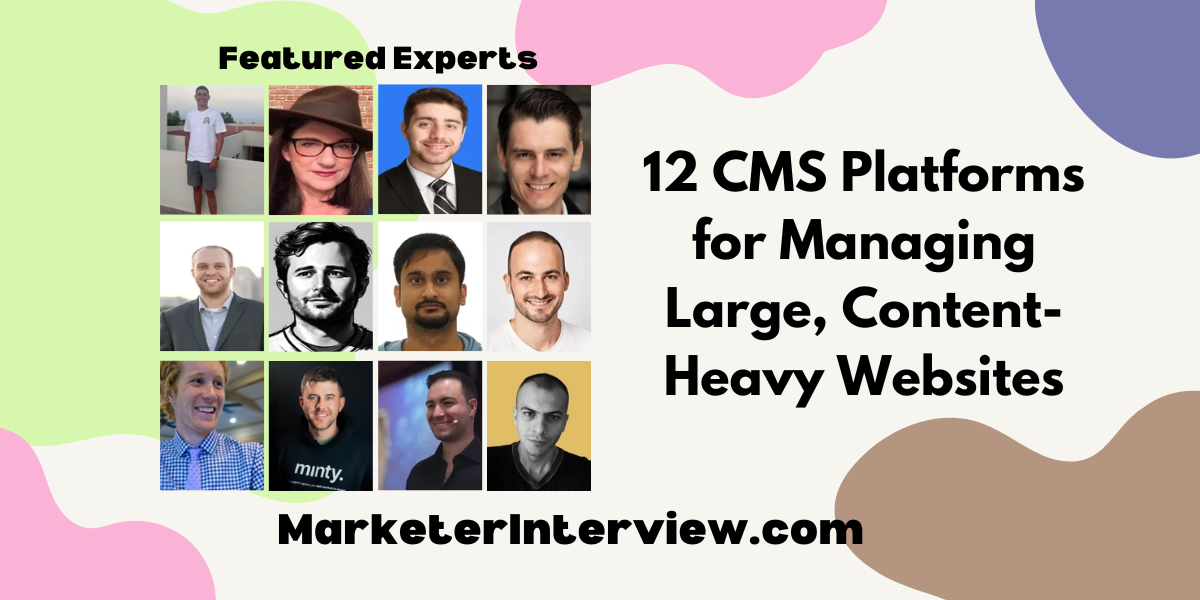12 CMS Platforms for Managing Large, Content-Heavy Websites
Navigating the crowded landscape of content management systems (CMS) can be daunting for anyone managing a large content-heavy website. Insights from leading professionals, such as a Co-founder & CEO and an Operations Manager, can illuminate the path forward. The first expert advises on choosing the right CMS for your needs, while the final expert highlights the benefits of Shopify. In total, this article presents twelve invaluable insights from industry experts.
Want to get quoted in MarketerInterview.com content just like this? Apply to become a contributor today!
Contents
- 1 Choose the Right CMS for Your Needs
- 2 Concrete5: Ideal for Content Management
- 3 Webflow: Powerful and Intuitive Interface
- 4 Drupal: Advanced Features for Complex Sites
- 5 DatoCMS: Efficient Real-Time Collaboration
- 6 Wagtail: Scalable and Customizable CMS
- 7 WordPress: Flexible and User-Friendly
- 8 Contentful: Ideal for E-Commerce Sites
- 9 HubSpot CMS: Easy Updates and Personalization
- 10 WordPress or Drupal: Depends on Needs
- 11 Strapi.js: Flexible and Scalable CMS
- 12 Shopify: Scalable and User-Friendly
Choose the Right CMS for Your Needs
When managing a large, content-heavy website, choosing the right CMS (Content Management System) is crucial. WordPress is a flexible option, offering a vast array of plugins and themes, but you’ll need to manage performance as your site grows. Drupal is perfect for complex sites, known for its security and scalability, though it’s more technical to manage. Joomla provides a nice middle ground, offering more flexibility than WordPress with less complexity than Drupal.
For those needing cross-platform content delivery, Contentful’s headless CMS lets you manage content independently from its presentation. On the enterprise side, Sitecore and Adobe Experience Manager (AEM) excel in personalization and handling massive amounts of content, but they come with higher costs and technical demands. Ultimately, the best CMS for you depends on your website’s size, complexity, and budget.

Beth Patton, Website designer and developer, Manatee Digital Media
Concrete5: Ideal for Content Management
As a seasoned tech CEO for a large content-driven website, I highly recommend using Concrete5 CMS. Its unique revision-tracking feature ensures no content is ever lost, making it ideal when dealing with volumes of content. The in-context editing function, similar to the ease of updating a Word document, makes it intuitive even for non-tech employees, reinforcing collaboration. Its robust security measures make it a secure choice for any business. In short, Concrete5 is my go-to CMS for its easy usability, security, and practicality.

Abid Salahi, Co-founder & CEO, FinlyWealth
Webflow: Powerful and Intuitive Interface
I recommend Webflow for managing a large, content-heavy website. Webflow offers a powerful and intuitive visual interface for building and managing websites, making it a great choice for content-heavy sites. Some tips for using Webflow include taking advantage of its responsive design features to ensure your content looks great on all devices and exploring its CMS capabilities for efficient content management. You can also find inspiring examples of websites built with Webflow on their showcase page to get ideas for your own project.

Tom Molnar, Operations Manager, Fit Design
Drupal: Advanced Features for Complex Sites
I recommend considering Drupal for managing a large content-heavy website. While WordPress is popular, Drupal offers advanced features that can be particularly beneficial for complex content-management needs.
One of Drupal’s standout aspects is its exceptional scalability. It can handle vast content and high traffic without compromising performance, making it ideal for large organizations or enterprises. Its robust taxonomy system allows for intricate content categorization, which can help users navigate extensive content libraries seamlessly.
Another significant advantage is Drupal’s emphasis on security. Regular security updates and a dedicated security team provide peace of mind for businesses prioritizing data protection. This is crucial for organizations dealing with sensitive information or regulatory compliance.
Moreover, Drupal offers powerful customization capabilities. The extensive range of modules allows you to tailor your website precisely to your needs, whether integrating e-commerce functionalities, creating user-friendly content workflows, or optimizing for SEO.

James Parsons, CEO, Content Powered
DatoCMS: Efficient Real-Time Collaboration
We’ve used DatoCMS for several projects, and it’s been great. Recently, we launched an e-commerce site using DatoCMS, and its real-time-collaboration features helped us work faster and more efficiently. The GraphQL API also let our developers create a more interactive site, which led to a 30% increase in organic traffic in the first month. Overall, DatoCMS has been a solid choice for us, making it easier to manage content and improve website performance.

Ryan Doser, Co-Founder, AI Insider Tips
Wagtail: Scalable and Customizable CMS
I recommend Wagtail for managing a content-heavy website for its scalability feature, which allows you to manage large amounts of content without sacrificing your website’s performance.
Earlier, we used WordPress to manage our website, which was sufficient for light-content pages. When we expanded our services, we needed a powerful CMS for managing large volumes of content and optimizing page speed. So, we switched to Wagtail CMS, which offers a variety of built-in functionality.
First, its open-source architecture allowed us to customize and develop the exact site we needed. Second, with its A/B-testing feature, we could measure the performance of our website without diving into too many technicalities. Third, we could create customizable page types and workflows, reducing the need for external plugins and integrations.
Finally, with its user-friendly interface, we managed and maintained the heavy content on our website with little effort. With such powerful features, we run our text-rich, visually appealing website comfortably.
If you are looking for a CMS to manage a large content-heavy website, try Wagtail. Its scalability, customization, and advanced A/B-testing features will ease the process and improve your online presence.

Soubhik Chakrabarti, CEO, Canada Hustle
WordPress: Flexible and User-Friendly
I highly recommend WordPress as the CMS for managing a large, content-heavy website. Its flexibility, scalability, and extensive plugin ecosystem make it an excellent choice for handling complex content structures while providing a user-friendly interface.
WordPress supports various content types, including blog posts, pages, multimedia, and custom post types, allowing you to organize content effectively. Its robust taxonomy system, featuring categories and tags, enables easy navigation and enhances the user experience.
It also has many plugins to optimize performance, improve SEO, and facilitate analytics. For example, plugins like Yoast SEO help ensure your content is optimized for search engines, while caching plugins can enhance site speed—a critical factor for content-heavy sites.
It is also open-source, which means a vibrant community continuously improves its functionality. Whether you’re integrating e-commerce capabilities or advanced analytics, there’s likely a solution that fits your needs.

Josh Bluman, Co-Founder, Hoppy Copy
Contentful: Ideal for E-Commerce Sites
For managing a large, content-heavy e-commerce website, I’d recommend Contentful as the go-to CMS. It’s a headless system that offers exceptional flexibility and scalability—perfect for handling extensive product catalogs and rich content. Contentful’s API-first approach allows seamless integration with various front-end frameworks, enabling a custom-tailored user experience.
Its robust content-modeling capabilities support complex product hierarchies and relationships, while the intuitive interface simplifies content creation and management for teams. The system excels in omnichannel delivery, ensuring consistent content across web, mobile, and other platforms.
Contentful’s powerful localization features are invaluable for global e-commerce operations. Also, its version control and content-scheduling functionalities streamline workflow management. While it requires some technical expertise to set up, the long-term benefits in content organization, performance, and scalability make it an ideal choice for large-scale e-commerce sites.

Jason Horner, President, TabShop
HubSpot CMS: Easy Updates and Personalization
I believe HubSpot CMS is great for big websites with lots of content. At Minty Digital, we helped a global education company use it for their site. They had tons of videos and articles to manage. With HubSpot, their team could easily update content without special training. The company saw their search rankings go up 30% in six months, and more people used their site. HubSpot CMS made it simple to personalize content for different users, which really improved their results.

Charlie Clark, Public Speaker and Founder, Minty Digital
WordPress or Drupal: Depends on Needs
For managing a large and content-heavy website, I recommend WordPress or Drupal, depending on your specific needs.
WordPress is ideal if you are looking for ease of use, flexibility, and a large variety of plugins to enhance functionality without needing extensive coding. It is also highly scalable, and many big websites, including media companies, use WordPress.
If you require more customization, especially for complex content workflows and user permissions, Drupal might be the better choice. It is more robust for handling large amounts of content and can be tailored for unique content architectures.
Both platforms have strong community support, but WordPress offers easier onboarding, while Drupal is stronger for more technical teams needing fine-grained control.

Ronald Osborne, Founder, Ronald Osborne Business Coach
Strapi.js: Flexible and Scalable CMS
Strapi.js is an excellent choice for managing a large, content-heavy website for several reasons:
- Flexibility and Customizability: Strapi is an open-source, headless content management system (CMS) that offers significant flexibility. It allows you to structure your content-management setup to match the specific requirements of your website without being tied to specific front-end frameworks. This makes it ideal for websites that need to serve content across multiple platforms like web, mobile apps, or other connected devices.
- Ease of Use: Despite its powerful features, Strapi has a user-friendly interface that simplifies the tasks of creating, updating, and managing content. The admin panel is intuitive, which can be a huge plus for content editors and marketers who may not be very technical.
- Scalability: Strapi can handle large amounts of data and scale to accommodate growth in content volume and traffic, which is crucial for large, content-heavy sites. Its performance doesn’t degrade as the size of your content database grows, thanks to its efficient data handling and the ability to integrate with various databases like MongoDB, PostgreSQL, MySQL, SQLite, and more.
- Custom Content Structures: With Strapi, you can easily create custom content types and relationships between them. This capability allows for complex content architectures, making it suitable for large websites that require detailed and interconnected content structures.
- RESTful API: Strapi automatically generates a customizable API based on your content structures. This feature is particularly powerful for content-heavy sites that need to serve the same content across different channels, as it simplifies the process of API integration and maintenance.
- Community and Plugin Ecosystem: Being open-source, Strapi has a vibrant community and a growing ecosystem of plugins. This can significantly reduce development time since many features can be added by simply integrating plugins. Moreover, community support can be invaluable for troubleshooting and enhancing the CMS.
- Security Features: Strapi includes robust security features out of the box. It supports advanced authentication and authorization processes, including JWT authentication, role-based permissions, and third-party providers for login.
These features make Strapi an attractive option for enterprises or any large-scale operations that need a reliable, scalable, and flexible CMS to manage extensive content repositories effectively.

Stefan Smiljkovic, Founder, Automatio AI
Shopify: Scalable and User-Friendly
Shopify is not only a leading e-commerce platform but also a strong option for managing large, content-heavy websites due to its scalability, user-friendly interface, and robust features. Shopify’s infrastructure is highly scalable, built to handle substantial traffic and data loads, which makes it ideal for large websites with extensive content.
Additionally, Shopify’s integration with a Content Delivery Network (CDN) ensures that pages load quickly, regardless of the user’s location—an essential feature for sites hosting a lot of media content, such as images and videos. This level of performance is complemented by Shopify’s built-in security measures, providing SSL certification and automatic updates that ensure the platform remains secure and reliable.
One of Shopify’s significant advantages is its user-friendly content management system. With an intuitive editor that supports multimedia content, it enables even non-technical users to create, edit, and organize large amounts of text, images, and video. Shopify also includes blogging features, which allow content to be easily categorized, tagged, and published, making it well-suited for content-driven websites such as magazines, news sites, and blogs.
Moreover, Shopify offers a broad selection of customizable themes and templates, along with support for custom coding. This flexibility is enhanced by Shopify’s extensive app ecosystem, which includes plugins that can expand the platform’s capabilities—like SEO tools, content optimization, and social media integrations—making it possible to tailor the site to meet specific needs.
In terms of SEO, Shopify provides robust built-in tools such as customizable meta tags, clean URL structures, and automatic XML sitemaps, which make it easier for search engines to index and rank large websites effectively. For content-heavy sites aiming for a broad reach, Shopify also offers seamless integration with marketing and analytics tools like Google Analytics and Facebook Pixel.
These integrations offer insights into content performance and help distribute content across multiple channels, while Shopify’s ecommerce features make it possible to easily monetize content or sell related products. This combination of features makes Shopify an excellent choice for those looking to build a large, content-heavy website with the flexibility to incorporate e-commerce seamlessly.

Sam Cooper, Shopify Lead Developer, 1HUTCH
Want to get quoted in MarketerInterview.com content just like this? Apply to become a contributor today!






